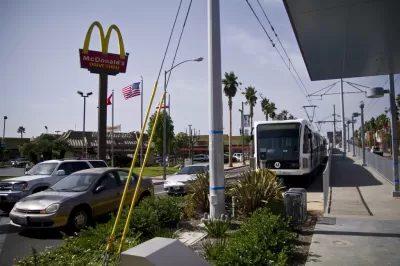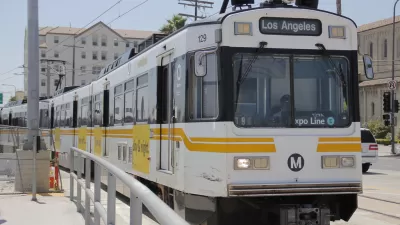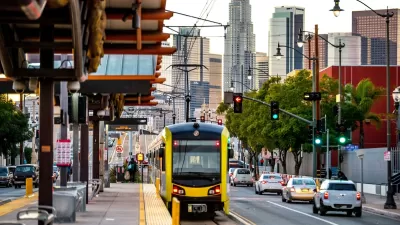Bad news for transit advocates in Los Angeles this week, as the Los Angeles Time reported data that makes the region's transit investments look like something less than money well spent.

Los Angeles, lauded for its sweeping investment in rail transit around the city and surrounding county, hasn’t yet adopted transit in a way that reflects that investment.
"For almost a decade, transit ridership has declined across Southern California despite enormous and costly efforts by top transportation officials to entice people out of their cars and onto buses and trains," report Laura J. Nelson and Dan Weikel.
After that lede, the reports follow with more specifics:
The Los Angeles County Metropolitan Transportation Authority, the region's largest carrier, lost more than 10% of its boardings from 2006 to 2015, a decline that appears to be accelerating. Despite a $9-billion investment in new light rail and subway lines, Metro now has fewer boardings than it did three decades ago, when buses were the county's only transit option.
The article notes that trend also holds true for nearby regional transportation agencies, such as the Orange Country Transportation Agency, as well.
The article includes some speculation about why more people aren’t adopting transit and details the complicated history of transit politics in Southern California, but it also reaches a disappointing conclusion: "The decline suggests that Southern California policymakers are falling short of one of their longtime goals: drawing drivers out of their cars and onto public transportation to reduce traffic congestion, greenhouse gases and the region's reliance on fossil fuels."
With several projects still under construction, including a light rail extension to Santa Monica, and a bus system targeted for an overhaul, the transit future of Los Angeles is still very much to be determined. For those looking for some reason to doubt the implications of the L.A. Times' coverage of the data, Ethan Elkind has already written a response, which calls out the newspaper for misleading use of statistics and selective comparisons in making the decline in ridership look worse than it is.
FULL STORY: Billions spent, but fewer people are using public transportation in Southern California

Study: Maui’s Plan to Convert Vacation Rentals to Long-Term Housing Could Cause Nearly $1 Billion Economic Loss
The plan would reduce visitor accommodation by 25,% resulting in 1,900 jobs lost.

North Texas Transit Leaders Tout Benefits of TOD for Growing Region
At a summit focused on transit-oriented development, policymakers discussed how North Texas’ expanded light rail system can serve as a tool for economic growth.

Why Should We Subsidize Public Transportation?
Many public transit agencies face financial stress due to rising costs, declining fare revenue, and declining subsidies. Transit advocates must provide a strong business case for increasing public transit funding.

How to Make US Trains Faster
Changes to boarding platforms and a switch to electric trains could improve U.S. passenger rail service without the added cost of high-speed rail.

Columbia’s Revitalized ‘Loop’ Is a Hub for Local Entrepreneurs
A focus on small businesses is helping a commercial corridor in Columbia, Missouri thrive.

Invasive Insect Threatens Minnesota’s Ash Forests
The Emerald Ash Borer is a rapidly spreading invasive pest threatening Minnesota’s ash trees, and homeowners are encouraged to plant diverse replacement species, avoid moving ash firewood, and monitor for signs of infestation.
Urban Design for Planners 1: Software Tools
This six-course series explores essential urban design concepts using open source software and equips planners with the tools they need to participate fully in the urban design process.
Planning for Universal Design
Learn the tools for implementing Universal Design in planning regulations.
City of Santa Clarita
Ascent Environmental
Institute for Housing and Urban Development Studies (IHS)
City of Grandview
Harvard GSD Executive Education
Toledo-Lucas County Plan Commissions
Salt Lake City
NYU Wagner Graduate School of Public Service





























